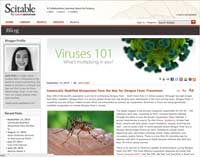Blog about it! Getting students closer to science Understand article
Teen blogger Julia Paoli and her teacher Lali DeRosier discuss how blogging can help science students

101
Image courtesy of Julia Paoli
Last spring, Lali DeRosier was at a science communication conference geared towards teen bloggers. By chance, she learned that Scitable was looking for more school-aged students to join their blog network, Young Voices. Scitable is the education branch of Nature Publishing Groupw1. “They have three levels of bloggers,” she explains. “Professional researchers, undergraduate students who are studying science, and high school students.”
Armed with application details, Lali returned from the conference and set about finding volunteers.
Scitable now hosts four blogs written by students from Lali’s school: Trinity Preparatory School in Florida, USA. At 16 years old, Julia Paoli is the youngest of these bloggers with a blog called Viruses 101w2. “Viruses make a really good blog topic because most people are interested in them and there is enough new research for it to be continued week after week,” Julia explains.
Behind the blog
Each blog post focuses on a new piece of published research or something that has been in the news related to viruses. Julia often selects the topic herself after scouring the internet for ideas. “I also get ideas thrown at me from my parents, Mrs DeRosier or classmates,” she says. “Sometimes my editors at Scitable will tell me something they want me to focus on.” For instance, a recent blog entry covered the controversy surrounding the price of two new hepatitis C drugs in the USA. In another, Julia discussed the discovery that viruses coated in silica can survive in environments similar to those on Mars. “Right now I’m working on a piece on smallpox because the editors at Scitable want me to do a piece in conjunction with another blog.”
Before writing a post, Julia reads relevant journal articles as well as blog and news articles on the topic. “Occasionally I also reach out to a scientist and email them,” she says. When she first started blogging, the Scitable editors would edit her posts before publishing them but now she has more of a free reign.
Julia still gets some help editing her posts, but from her dad, she explains. “I’m very lucky because my dad has a science background and knows what I am writing about.”
Blogging as a step into science
The student’s view
Blogging has not only allowed Julia to learn more about science but also opened up other opportunities. In February she attended, and blogged about, her first science communication conference, ScienceOnline Togetherw3. Her highlights of the three-day conference include learning about new genres of science communication, such as songs about science and science comics. She also got to try ice cream made using dry ice for the first time.

Julia aims to write two blog posts a month, but it is sometimes hard for her to find time between schoolwork and her other hobbies, such as dancing and violin. It is feedback from readers, she says, that keeps her writing. “People reach out to me from all different walks of life, asking me questions or giving me positive feedback, which really encourages me to write,” says Julia. “It makes my day to know that people are reading my work and learning.” Julia encourages other teenagers interested in both science and writing to start a blog too.
With two years left to go in high school, Julia sees herself pursuing a career in science. “At this point I don’t think I want to go into a writing profession. I like writing but I’d rather do hands-on science. But I don’t know yet what field,” she says.
The teacher’s view

micrograph of Ebola virus
particles. Ebola has recently
been in the news and
featured on Julia’s blog.
Images courtesy of Thomas W.
Geisbert, Boston University
School of Medicine
For Lali, having teen bloggers in her flock has been a very positive experience and hasn’t added much extra work. She has organised a couple of meetings with the blogging group to get feedback from them and talk about the process. “But because Scitable is so organised on their end,” she adds, “it’s not a lot for me. I’m kinda just an all-round cheerleader.”
Lali is a big fan of incorporating blogs into the teaching of science. “For both readers and writers, blogs are a really good segue into more formal science writing,” she says. “They are a great way to get people involved in very complex science topics in a non-intimidating way.”
Blog posts tend to be shorter and the language tends to be more informal than journal or news articles, Lali explains. “They can be in lots of different voices and styles: they can be serious tone, they can be investigative, and they can be more fun. So it gives a lot of flexibility into what people are interested in reading and what they are interested in writing.”
Lali incorporates blog posts, both those written by her students and from other sources, in her classes. “Rather than give my students a dry research article to read”, she explains, “I can give them some blog posts about that topic before I introduce the formal research itself.” Other blogs she uses include ones hosted by National Geographic, Discover Magazine and Scientific American.
Working with blogging has also inspired Lali to add new aspects to her teaching. “I am currently working with a graduate student to develop a science writing curriculum to be integrated in our school,” she concludes.
Web References
- w1 – Scitable is a free science library and personal learning tool from Nature Publishing Group. Visit the blogs homepage.
- w2 – Read Julia’s Viruses 101 blog.
- w3 – ScienceOnline was a nonprofit organisation aimed at those who conduct or communicate science online with an annual ScienceOnline Together conference.
Resources
- Leli also has her own blog where she discusses science, education, and research.
Review
The article is an excellent testimony about the benefits of blogging for learning and teaching science, namely at pre-university level. It is particularly interesting because the bloggers are students and not, as is more common, the teacher.
Betina da Silva Lopes, Portugal





